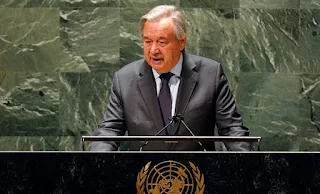The 49th session of the United Nations Human Rights Council kicked off in Geneva on 28 February.
Russia's ongoing offensive in Ukraine and Russia's ongoing human rights abuses in Ukraine have been the main topics of the Human Rights Council, but human rights abuses in China's Uyghur region have also been raised by representatives of various countries.
Speaking at the conference, UN Secretary-General Antonio Guterres once again called on China to allow the International Commission of Inquiry to visit the Uyghur region and allow Uyghurs to investigate the situation.
"I have just returned from a visit to China, and during the talks there, I expressed the hope that the high-level delegation would make a" credible visit "to the Chinese regions, including the Xinjiang Uyghur Autonomous Region, and that the Chinese government would accept it," he said.
At a time when Russia's military offensive against Ukraine and the issue of sanctions against Russia are at the forefront of the international arena, the re-investigation of UN Secretary-General Antonio Guterres' investigation into China's human rights abuses against Uighurs has caught the attention of political analysts.
Emma Rally, a UN official, last year revealed that the UN High Commissioner for Human Rights (OHCHR) has been sending the list of Uyghur and Tibetan representatives attending the UN General Assembly since 2013 to the Chinese government.
Speaking on March 1, US Secretary of State Anthony Bellin stressed that Russia had violated the core principles of international peace and security by invading Ukraine and created a human rights and humanitarian crisis. He strongly condemned Russia's human rights abuses and spoke out against China's human rights abuses.
"The Chinese government continues to commit genocide and crimes against humanity in Xinjiang, mainly against Muslim Uyghurs and other minorities," he said. We urge the Supreme Council to release its report on the situation there immediately. "
The meeting was attended by Chinese Foreign Minister Wang Yi, who has always played a beautiful role in protecting human rights. Chinese Foreign Ministry Spokeswoman Wang Wenbin's Regular Press Conference on March 2, 2010, in Beijing, China. He strongly condemned China's "genocide" against the Uyghurs.
Mr. Dolgun Isa, President of the World Uyghur Congress, was interviewed by our radio. “Mr. Antonio Guterres reiterated the need to investigate the situation of the Uyghurs after a long period of silence,” he said. "It simply came to our notice then.
The British Foreign Secretary, Liz Truss, also stressed the need for the council to work together to address Russia's aggression in Ukraine. "We are also concerned about human rights abuses in China, especially in Xinjiang, Tibet and other parts of the world," he said.
At the meeting, representatives of many countries expressed their concerns not only about the Ukraine issue, but also about the Uyghur issue.
The Czech representative reiterated his concern over the detention of Uighurs in the camps and demanded their immediate release. The Turkish envoy called on the Turkish government to pay attention to the human rights abuses faced by the Uyghurs and to allow the UN Supreme Council to visit the Uyghur region indefinitely. The Danish envoy also called on the Chinese government to send a "significant visit" to the UN Human Rights Council.
Speaking at the Munich Security Conference in Munich, Germany on February 18, Antonio Guterres said that UN High Commissioner for Human Rights Michelle Bachelet should make a "credible" visit to the Uyghur region. In an interview with VOA, Bachelet's office said that since the revelation of human rights abuses in the Uyghur region, the UN Office for the Coordination of Human Rights has been collecting, recording and analyzing information on the issue.
It is reported that the UN Human Rights Council holds regular meetings three times a year, lasting four weeks in March, three weeks in June and three weeks in September, for a total of ten weeks. The conference will focus on human rights issues around the world.
Tags:
america
american citizen
american city
american island
argentina
brazilian amazon
latin america
latin american
mexican
mexico
north america



